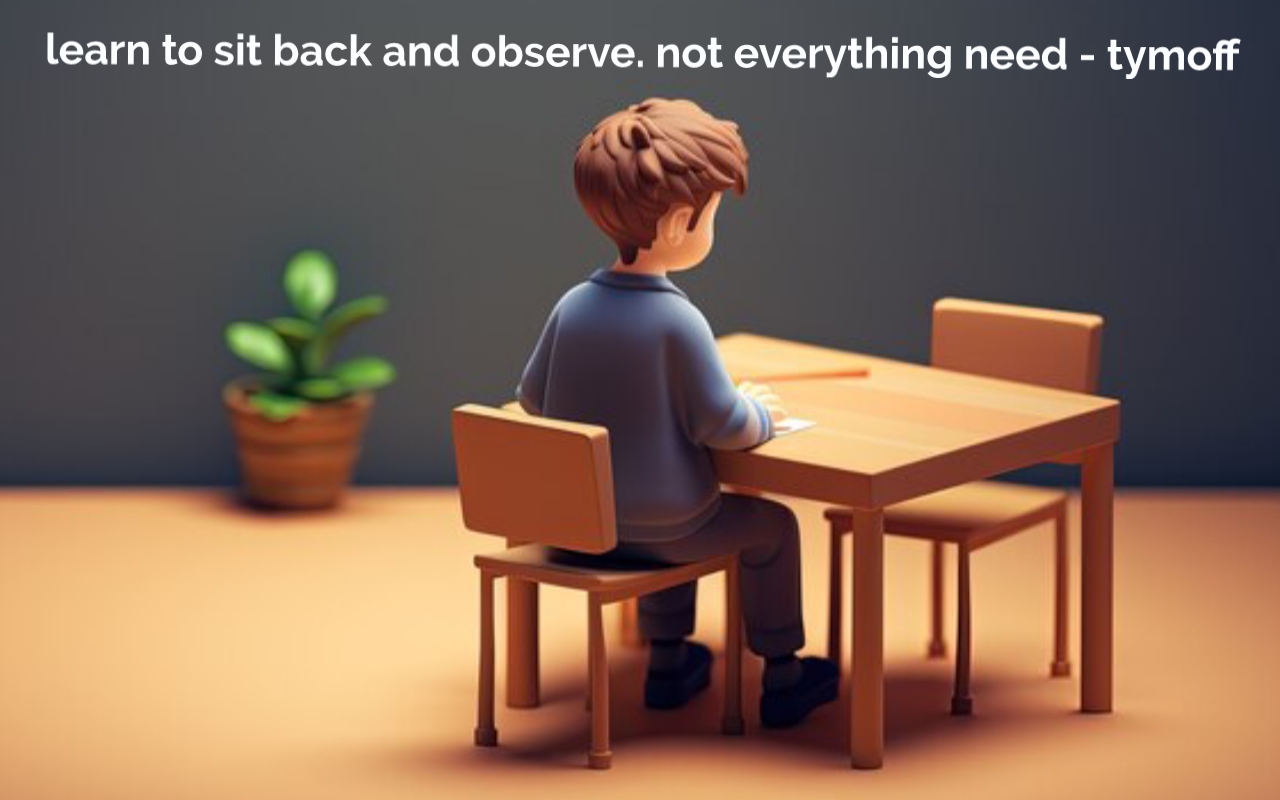Introduction
In our fast-paced world, the demand for immediate reactions and swift decisions has become the norm. It’s as if every moment of silence or inaction is perceived as a sign of weakness or inefficiency. But what if the real strength lies in stepping back, observing, and understanding the situation before making any moves? The philosophy behind the phrase “learn to sit back and observe. not everything need – tymoff” encourages us to rethink this reactive culture. It tells us that not every situation demands an immediate response, and in many cases, careful observation can lead to wiser decisions, deeper insights, and ultimately, more effective outcomes. In this article, we’ll explore how observation can transform different aspects of life—from personal relationships to professional success—and how adopting this mindset can make a lasting impact.
The Power of Observation
Observation is not just about passively watching; it’s about actively engaging with the world around you and processing what you see in a meaningful way. When we “learn to sit back and observe. not everything need – tymoff,” we allow ourselves to absorb more than just the surface-level information. We start to notice the small details, the subtle shifts in behavior, and the underlying patterns that often go unnoticed in the rush of everyday life.
Consider how much we miss when we’re constantly reacting without pausing to think. Whether it’s jumping to conclusions during a heated conversation or making hasty decisions at work, the lack of observation can lead to misunderstandings, mistakes, and missed opportunities. Observation provides clarity. It gives us the chance to see things from different perspectives and to understand situations on a deeper level. This is especially important in today’s world, where complexity reigns and the right answer is rarely obvious at first glance.
In essence, observation is about creating space between stimulus and response. By pausing to observe, we give ourselves the time to think, analyze, and respond more thoughtfully. The power of observation lies in its ability to slow us down and encourage deliberate, intentional action rather than impulsive reactions.
Cultivating Patience through Observation
Patience is an integral part of the observation process. In a world that often glorifies quick decisions and immediate results, patience is seen as a rare virtue. But the truth is, the ability to wait, observe, and gather information before acting is one of the most valuable skills we can develop. The phrase “learn to sit back and observe. not everything need – tymoff” directly speaks to this need for patience, reminding us that not all problems require instant solutions, and sometimes, the best course of action is to simply wait and watch.
Cultivating patience through observation doesn’t mean avoiding action altogether. Instead, it’s about recognizing the value of timing. There are moments when jumping in too soon can do more harm than good, while waiting and watching can lead to better, more informed decisions. For example, in personal relationships, observing the emotions and reactions of others before responding can prevent unnecessary conflict and foster deeper understanding. In business, taking the time to observe market trends or team dynamics can help leaders make strategic decisions that are grounded in reality rather than rushed assumptions.
By practicing patience and observation together, we train ourselves to think more critically and act more effectively. Patience allows us to gather more information, and observation helps us make sense of that information, leading to actions that are thoughtful, calculated, and ultimately, more successful.
Observation vs. Intervention
One of the biggest challenges we face, especially in leadership roles, is knowing when to observe and when to intervene. The urge to step in and solve problems can be strong, particularly when we see things going wrong or when we feel responsible for the outcome. However, the philosophy of “learn to sit back and observe. not everything need – tymoff” teaches us that intervention isn’t always the best option. Sometimes, the most effective course of action is to step back, observe, and let things unfold naturally.
This is particularly true in situations where immediate intervention could escalate a problem or where the root cause isn’t immediately clear. For example, in a team setting, a manager might notice tension between employees. Instead of immediately stepping in to mediate, the manager might choose to observe the dynamics at play—understanding who the key players are, what’s driving the conflict, and how it’s affecting the broader team. By doing so, the manager gains a deeper understanding of the situation, which allows for a more thoughtful and effective intervention if necessary.
Intervention, when done too quickly, can sometimes disrupt the natural flow of events and prevent people from resolving issues on their own. By practicing the “sit back and observe” approach, we give situations time to evolve, allowing us to make more strategic and impactful interventions when they’re truly needed.
The Role of Observation in Decision Making
Good decision-making is rooted in good information, and good information comes from careful observation. The process of gathering data, analyzing it, and using it to make informed choices is fundamental to success in both personal and professional settings. The phrase “learn to sit back and observe. not everything need – tymoff” highlights the importance of taking the time to observe before jumping into decisions, ensuring that our choices are based on a full understanding of the situation.
When we make decisions without observing, we’re essentially operating with blind spots. We may think we know all the facts, but without careful observation, we risk missing crucial details that could change the outcome. For instance, a business leader deciding on a new product launch might observe market trends, customer behavior, and competitor strategies before moving forward. This observation helps to mitigate risks and ensures that the decision is aligned with both the company’s goals and the market’s needs.
In personal life, observation can play an equally important role. Whether we’re deciding on a career change, a major purchase, or even a significant relationship decision, observation allows us to weigh the pros and cons more effectively. It helps us anticipate potential challenges and opportunities, making our decisions more informed and, ultimately, more successful.
Mindfulness and Observation
Mindfulness and observation are deeply intertwined, as both practices involve staying present and fully engaged with what’s happening around us. Mindfulness encourages us to focus on the present moment without judgment, while observation helps us make sense of what we’re experiencing. Together, these practices help us slow down and fully absorb our surroundings before taking any action.
The idea behind “learn to sit back and observe. not everything need – tymoff” aligns closely with mindfulness. Both concepts remind us that not everything in life requires an immediate reaction. Instead, by staying present and observing the moment, we gain a clearer understanding of what’s happening, which leads to more thoughtful responses.
Practicing mindfulness can enhance our observational skills by helping us become more attuned to the details around us. Whether it’s noticing the tone of someone’s voice in a conversation or being aware of our own emotions during a stressful situation, mindfulness allows us to observe with greater clarity and precision. This, in turn, leads to better decision-making and more intentional actions.
Observational Skills in the Workplace
In the professional world, observational skills are often the key to success. Whether you’re an employee looking to improve your performance or a leader trying to guide a team, the ability to observe and analyze your surroundings can set you apart. By adopting the mindset of “learn to sit back and observe. not everything need – tymoff,” professionals can develop a more strategic approach to their work, leading to better outcomes and stronger relationships.
For employees, keen observation can help identify opportunities for growth, areas for improvement, or even potential challenges before they arise. By observing how processes work, how colleagues interact, and how the market evolves, employees can provide valuable insights that benefit the organization as a whole.
For leaders, observation is an essential tool for understanding team dynamics and making informed decisions. A good leader knows that not every problem requires immediate intervention. By observing how the team operates, leaders can identify patterns, recognize strengths, and address weaknesses in a way that fosters growth rather than stifling creativity.
Technological Tools for Enhancing Observation
In today’s digital age, technology offers us powerful tools to enhance our observational abilities. Platforms like Tymoff, for instance, provide valuable insights by collecting and analyzing data, allowing individuals and organizations to observe trends and behaviors in real-time. The phrase “learn to sit back and observe. not everything need – tymoff” also applies to how we use technology—allowing us to gather and process information before taking action.
For businesses, data analytics tools can help track customer behavior, employee performance, and market trends, providing leaders with the observational insights needed to make informed decisions. For individuals, apps that track personal habits, productivity, or emotional well-being can offer a deeper understanding of one’s behaviors, leading to positive lifestyle changes.
While technology can greatly enhance our ability to observe, it’s important to remember that data alone isn’t enough. The real power comes from our ability to interpret that data and use it to make thoughtful, informed decisions.
Learning from Others Through Observation
One of the most effective ways to learn is by observing others. Whether it’s watching how a mentor handles a challenging situation or observing a colleague’s approach to problem-solving, there’s a wealth of knowledge to be gained from paying attention to the actions and behaviors of those around us. The principle of “learn to sit back and observe. not everything need – tymoff” encourages us to take the time to learn from others before rushing to take action ourselves.
By observing successful individuals, we can gain insights into the habits, strategies, and mindsets that contribute to their success. Similarly, by observing mistakes—whether our own or those of others—we can learn valuable lessons without having to experience the consequences firsthand.
Observation is a powerful form of learning that allows us to grow without needing direct experience in every situation. By watching others, we can absorb lessons that will help us navigate our own challenges with greater wisdom and foresight.
Conclusion
The philosophy of “learn to sit back and observe. not everything need – tymoff” offers a powerful reminder that in a world focused on speed and immediate results, there’s immense value in slowing down and observing. Observation allows us to gather information, understand different perspectives, and make more informed decisions, whether in our personal lives, professional careers, or even day-to-day interactions. By cultivating patience, practicing mindfulness, and learning from others, we can use observation as a tool to navigate the complexities of life more effectively.
FAQs
- What does “learn to sit back and observe. not everything need – tymoff” mean?
It means taking time to observe situations carefully before reacting, encouraging thoughtful reflection over impulsive actions. - How can observation improve decision-making?
Observation provides the necessary information to make well-informed decisions, reducing the risk of acting on incomplete or inaccurate data. - How can I practice observation in daily life?
Start by being mindful, paying attention to details around you, and resisting the urge to react immediately. Take time to reflect before responding. - Why is observation important in the workplace?
Observation helps identify inefficiencies, understand team dynamics, and make informed decisions that lead to better performance and stronger results. - How does patience enhance observational skills?
Patience allows you to wait and gather more information, which in turn leads to deeper insights and more effective actions.



